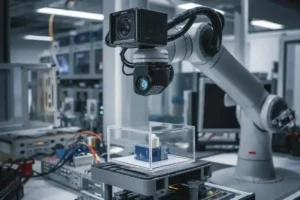All the Ways AI is Revolutionizing Software Testing: Transforming Quality, Speed, and Efficiency
Nowadays businesses are under increasing pressure to deliver high-quality software at lightning speed. As software development becomes more complex, ensuring that it works seamlessly across devices and platforms has become an enormous challenge. Traditional manual testing processes, while still valuable, are no longer sufficient to meet the demands of modern software development.
This is where Artificial Intelligence (AI) comes into play. When it comes to AI software testing for business these types of tools are revolutionizing the world of testing by automating and enhancing traditional testing practices. From improving test coverage to reducing human error, AI is transforming the way software is tested, increasing both efficiency and accuracy. Let’s explore the different ways AI is changing the landscape of software testing.
1. Automating Repetitive and Time-Consuming Tasks
One of the most significant ways AI is revolutionizing software testing is through automation. Software testing traditionally involves a lot of repetitive tasks such as executing test cases, validating results, and checking different versions of the software across various platforms. These tasks are often time-consuming and prone to human error.
AI-driven testing tools can automate these repetitive tasks, allowing testers to focus on more complex issues. AI can execute test cases across multiple platforms simultaneously, saving valuable time and resources. With AI, the testing process becomes more efficient, as tests are executed faster and without the need for constant human intervention. This automation leads to faster releases and more time for teams to work on innovation and new features.
2. Improved Test Coverage
AI can significantly enhance the test coverage that software development teams can achieve. Traditional testing relies on predefined test cases that often focus on the most common use cases and user flows. However, these tests may overlook edge cases, performance bottlenecks, or other less common scenarios.
AI testing tools can automatically create and execute a broader range of tests, including those that humans might not think to write. These tools can explore the software in ways that humans might miss, increasing the chances of identifying hidden bugs. Whether it’s cross-platform testing, performance testing, or exploratory testing, AI ensures that a wider range of scenarios are tested, improving the overall robustness of the software.
3. Enhancing Accuracy and Reducing Human Error
Human error is a common problem in manual testing, where testers may overlook certain scenarios, misinterpret results, or forget to run important test cases. AI helps eliminate these errors by consistently performing tasks with precision. AI algorithms follow pre-programmed guidelines without deviation, making them less susceptible to mistakes.
Additionally, AI can identify patterns and correlations in test data that humans might miss. By analyzing historical data and learning from previous tests, AI can predict potential failures and optimize test cases to focus on the most critical areas. This means that software is tested more thoroughly and with greater accuracy, leading to fewer defects in the final product.
4. Faster Feedback and Continuous Testing
In today’s agile development environments, developers need immediate feedback on their code changes to maintain fast iteration cycles. Traditional testing methods, especially manual tests, can create bottlenecks that delay feedback and slow down the development process.
AI-powered testing tools enable continuous testing, which means that tests can be run automatically as soon as new code is pushed. This ensures that developers receive immediate feedback on any issues, allowing them to make necessary adjustments in real time. Continuous testing also helps identify potential problems early in the development cycle, reducing the risk of critical issues slipping through the cracks.
The integration of AI into CI/CD (Continuous Integration/Continuous Delivery) pipelines also ensures that the testing process is continuously evolving. AI learns from each test run and can adapt to test more effectively, increasing the speed and efficiency of the entire development process.
5. Predictive Analysis for Better Risk Management
Another way AI is transforming software testing is through predictive analysis. By analyzing past test results and identifying trends in the data, AI can predict where future issues are likely to occur. This allows testing teams to focus their efforts on high-risk areas of the application.
For example, AI can flag parts of the code that have a history of defects or are most likely to fail based on similar patterns in past tests. This predictive capability helps businesses prioritize testing in the areas that matter most, reducing the risk of costly defects making it to production.
6. Improved Collaboration and Communication
AI tools foster greater collaboration between development, quality assurance, and product teams. These tools can generate real-time dashboards and detailed reports that make it easier for teams to track progress, share insights, and resolve issues quickly.
With AI-driven tools, there is greater transparency in the testing process. Testers, developers, and stakeholders all have access to the same data, allowing for better-informed decision-making. Clear communication ensures that everyone is aligned and that testing issues are addressed efficiently.
7. Faster Time to Market
The ultimate benefit of AI in software testing is faster time to market. By automating repetitive tasks, increasing test coverage, and providing faster feedback, AI enables software teams to release high-quality software more quickly. This is especially important in a competitive market where businesses need to stay ahead of customer expectations and respond to changing market demands in real time.
AI’s ability to speed up the testing process without compromising quality is a game-changer for businesses. Companies can continuously release updates and new features, ensuring that they remain competitive and relevant.
AI is revolutionizing software testing in many profound ways and with agentic AI software testing now being developed it opens up even more possibilities. By leveraging AI in software testing, businesses can ensure that their products are of the highest quality while maintaining the speed required to stay ahead in today’s fast-paced digital world.
The benefits of AI in testing—such as improved accuracy, better test coverage, faster feedback, and predictive analysis—are undeniable. As AI continues to evolve, its role in software testing will only become more integral, making it an essential tool for businesses aiming to achieve operational excellence and deliver innovative, bug-free software faster than ever before.











